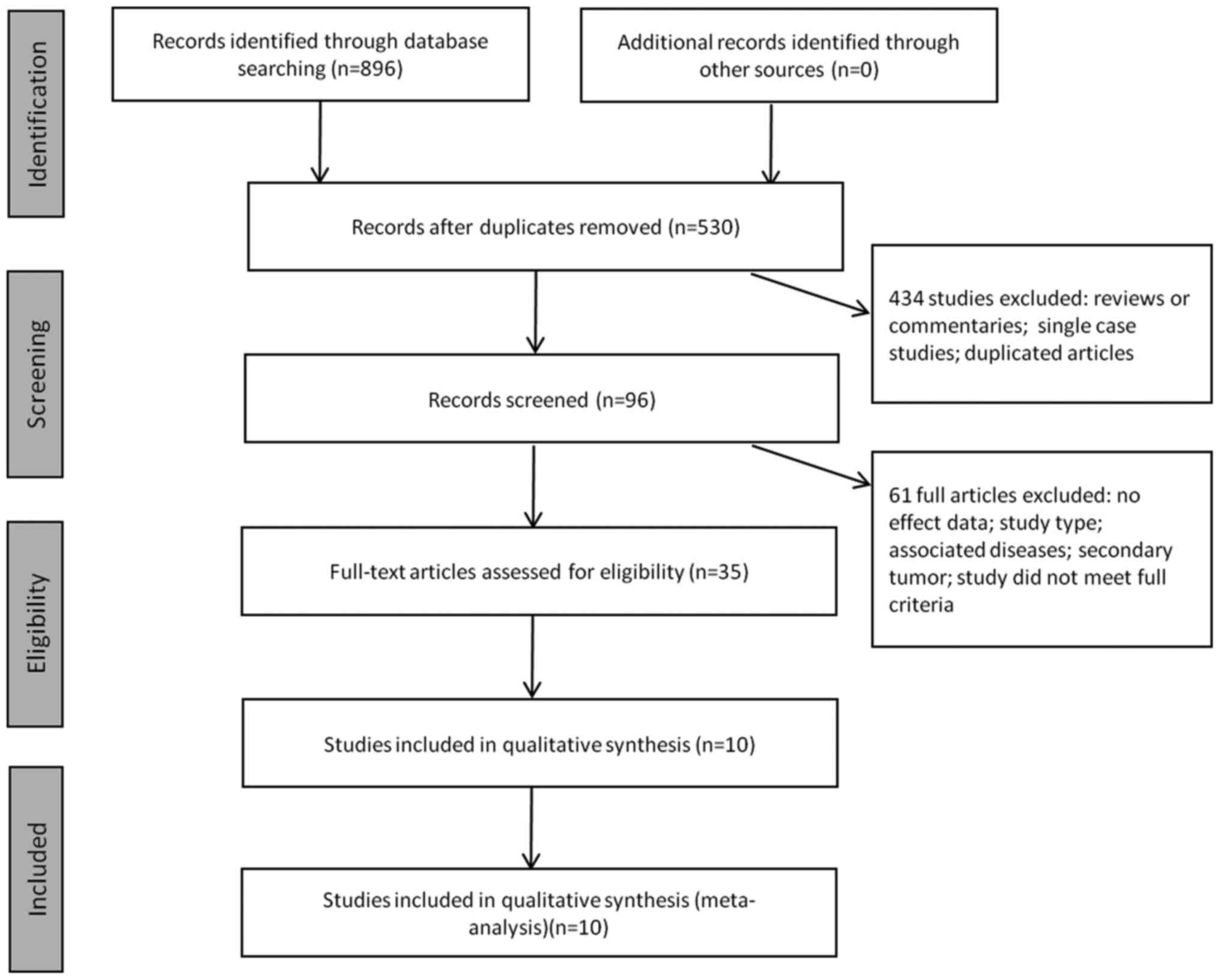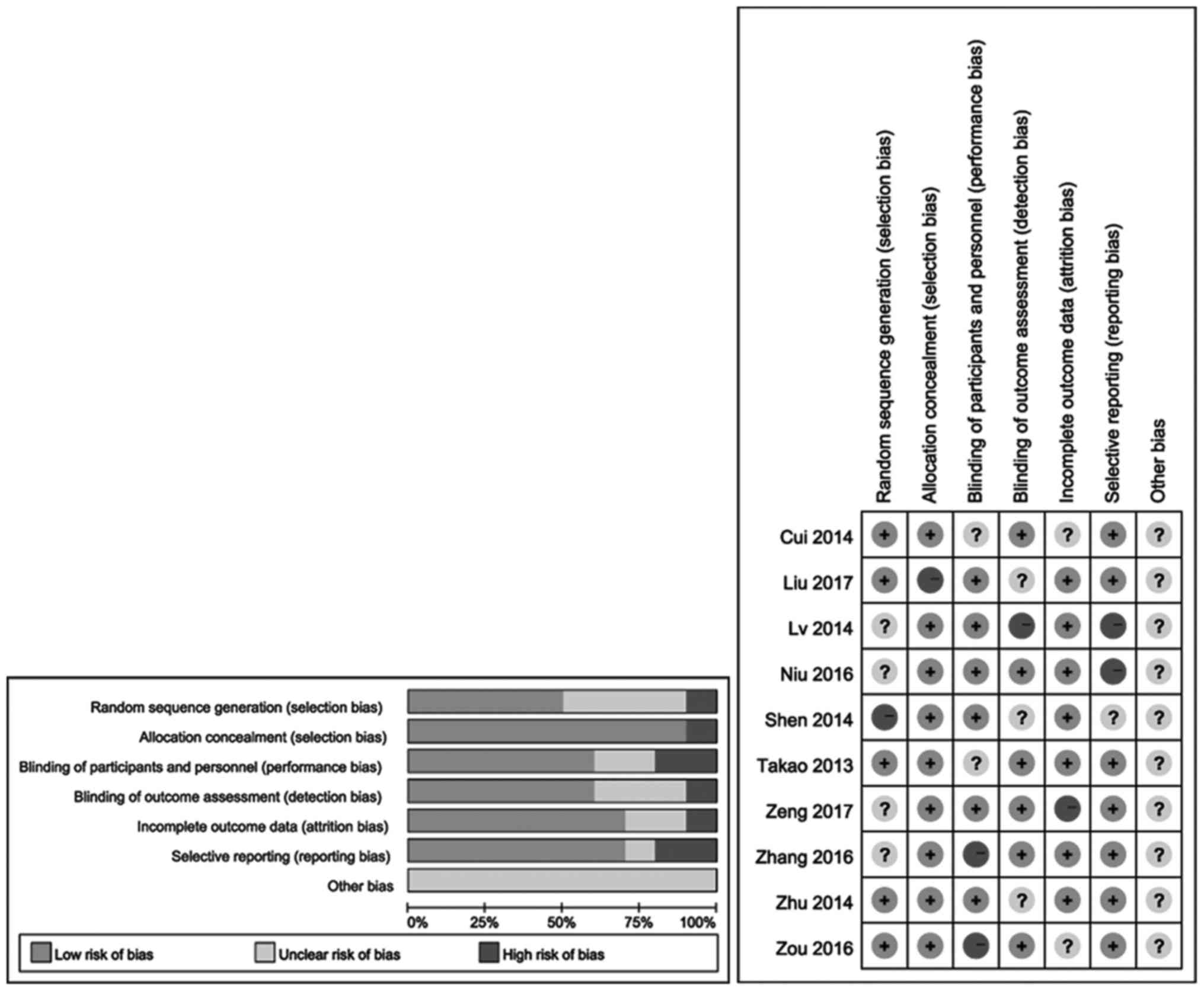|
1
|
Zhang H, Yuan W, Zhou Q, Gu X and Wang F:
Efficacy comparison of robotic and laparoscopic radical surgery in
the treatment of middle-low rectal cancer. Zhonghua Wei Chang Wai
Ke Za Zhi. 20:540–544. 2017.(In Chinese). PubMed/NCBI
|
|
2
|
Bjørn MX and Perdawood SK: Surgical
treatment of mid- and low rectal cancer. Ugeskr Laeger. 179:pii:
V11160801. 2017.(In Danish).
|
|
3
|
Kube R, Ptok H, Steinert R, Sahm M,
Schmidt U, Gastinger I and Lippert H: Clinical value of
laparoscopic surgery for colon cancer. Chirurg. 79:1145–1150.
2008.(In German). View Article : Google Scholar : PubMed/NCBI
|
|
4
|
Mabardy A, Lee L, Valpato AP and Atallah
S: Transanal total mesorectal excision with intersphincteric
resection and use of fluorescent angiography and a lighted urethral
stent for distal rectal cancer. Tech Coloproctol. 21:581–582. 2017.
View Article : Google Scholar : PubMed/NCBI
|
|
5
|
Guo Y, Wang D, He L, Zhang Y, Zhao S,
Zhang L, Sun X and Suo J: Marginal artery stump pressure in left
colic artery-preserving rectal cancer surgery: A clinical trial.
ANZ J Surg. 87:576–581. 2015. View Article : Google Scholar : PubMed/NCBI
|
|
6
|
Niu JW, Ning W, Wang WY, Pei DP, Meng FQ,
Liu ZZ and Cai DG: Clinical effect of preservation of the left
colonic artery in laparoscopic anterior resection for rectal
cancer. Zhonghua Yi Xue Za Zhi. 96:3582–3585. 2016.(In Chinese).
PubMed/NCBI
|
|
7
|
Zhang L, Zang L, Ma J, Dong F, He Z and
Zheng M: Preservation of left colic artery in laparoscopic radical
operation for rectal cancer. Zhonghua Wei Chang Wai Ke Za Zhi.
19:886–891. 2016.(In Chinese). PubMed/NCBI
|
|
8
|
Rutegård M, Hassmén N, Hemmingsson O,
Haapamäki MM, Matthiessen P and Rutegård J: Anterior resection for
rectal cancer and visceral blood flow: An explorative study. Scand
J Surg. 105:78–83. 2016. View Article : Google Scholar : PubMed/NCBI
|
|
9
|
Yasuda K, Kawai K, Ishihara S, Murono K,
Otani K, Nishikawa T, Tanaka T, Kiyomatsu T, Hata K, Nozawa H, et
al: Level of arterial ligation in sigmoid colon and rectal cancer
surgery. World J Surg Onco. 14:992016. View Article : Google Scholar
|
|
10
|
Yamamoto M, Okuda J, Tanaka K, Ishii M,
Hamamoto H and Uchiyama K: Oncological impact of laparoscopic
lymphadenectomy with preservation of the left colic artery for
advanced sigmoid and rectosigmoid colon cancer. Dig Surg.
31:452–458. 2014. View Article : Google Scholar : PubMed/NCBI
|
|
11
|
Matsuda K, Hotta T, Takifuji K, Yokoyama
S, Oku Y, Watanabe T, Mitani Y, Ieda J, Mizumoto Y and Yamaue H:
Randomized clinical trial of defaecatory function after anterior
resection for rectal cancer with high versus low ligation of the
inferior mesenteric artery. Br J Surg. 102:501–508. 2015.
View Article : Google Scholar : PubMed/NCBI
|
|
12
|
Tanaka J, Nishikawa T, Tanaka T, Kiyomatsu
T, Hata K, Kawai K, Kazama S, Nozawa H, Yamaguchi H, Ishihara S, et
al: Analysis of anastomotic leakage after rectal surgery: A
case-control study. Ann Med Surg (Lond). 4:183–186. 2015.
View Article : Google Scholar : PubMed/NCBI
|
|
13
|
Liu F and Zhang LA: A clinical comparative
study on reservation of left colic artery in laparoscopic resection
of rectal cancer. J Clin Experimental Med. 16:1013–1016. 2017.
|
|
14
|
Shen J, Li MZ, Du YF, Qu H and Zhang Y: A
comparative study of laparoscopic anterior resection of rectal
carcinoma with and without preservation of the left colonic artery.
Chin J Min Inv Surg. 14:22–24. 2014.(In Chinese).
|
|
15
|
Hinoi T, Okajima M, Shimomura M, Egi H,
Ohdan H, Konishi F, Sugihara K and Watanabe M: Effect of left
colonic artery preservation on anastomotic leakage in laparoscopic
anterior resection for middle and low rectal cancer. World J Surg.
37:2935–2943. 2013. View Article : Google Scholar : PubMed/NCBI
|
|
16
|
Nonaka S, Saito Y, Takisawa H, Kim Y,
Kikuchi T and Oda I: Safety of carbon dioxide insufflation for
upper gastrointestinal tract endoscopic treatment of patients under
deep sedation. Surg Endosc. 24:1638–1645. 2010. View Article : Google Scholar : PubMed/NCBI
|
|
17
|
Wolf FM: Meta-Analysis: Quantitative
methods for research synthesis by Fredric M. 1st edition. Sage
Publications Beverly Hills; CA: pp. 77–92. 1986
|
|
18
|
Gu H, Wang Y and Li W: The application of
cochrane risk of bias tools in meta-analysis of RCT. Chin Circ J.
29:147–148. 2014.
|
|
19
|
Murray AC, Chiuzan C and Kiran RP: Risk of
anastomotic leak after laparoscopic versus open colectomy. Surg
Endosc. 30:5275–5282. 2016. View Article : Google Scholar : PubMed/NCBI
|
|
20
|
Leake PA, Plummer JM, Rhoden A, Frankson
MA, Gordon-Strachan G, Powell LP and Roberts PO: Colorectal
anastomotic leakage at the university hospital of the west indies:
An analysis of risk factors. West Indian Med J. 62:711–715.
2013.PubMed/NCBI
|
|
21
|
Tocchi A, Mazzoni G, Fornasari V, Miccini
M, Daddi G and Tagliacozzo S: Preservation of the inferior
mesenteric artery in colorectal resection for complicated
diverticular disease. Am J Surg. 182:162–167. 2001. View Article : Google Scholar : PubMed/NCBI
|
|
22
|
Thomas MS and Margolin DA: Management of
colorectal anastomotic leak. Clin Colon Rectal Surg. 29:138–144.
2016. View Article : Google Scholar : PubMed/NCBI
|
|
23
|
Sekimoto M, Takemasa I, Mizushima T, Ikeda
M, Yamamoto H, Doki Y and Mori M: Laparoscopic lymph node
dissection around the inferior mesenteric artery with preservation
of the left colic artery. Surg Endosc. 25:861–866. 2011. View Article : Google Scholar : PubMed/NCBI
|
|
24
|
Dworkin MJ and Allen-Mersh TG: Effect of
inferior mesenteric artery ligation on blood flow in the marginal
artery-dependent sigmoid colon. J Am Coll Surg. 183:357–360.
1996.PubMed/NCBI
|
|
25
|
Seike K, Koda K, Saito N, Oda K, Kosugi C,
Shimizu K and Miyazaki M: Laser Doppler assessment of the influence
of division at the root of the inferior mesenteric artery on
anastomotic blood flow in rectosigmoid cancer surgery. Int J
Colorectal Dis. 22:689–697. 2007. View Article : Google Scholar : PubMed/NCBI
|
|
26
|
Komen N, Slieker J, de Kort P, de Wilt JH,
van der Harst E, Coene PP, Gosselink MP, Tetteroo G, de Graaf E,
van Beek T, et al: High tie versus low tie in rectal surgery:
Comparison of anastomotic perfusion. Int J Colorectal Dis.
26:1075–1083. 2011. View Article : Google Scholar : PubMed/NCBI
|

























